
Xylosma is a genus of flowering plants in the family Salicaceae. It contains around 100 species of evergreen shrubs and trees commonly known as brushhollies, xylosmas, or, more ambiguously, "logwoods". The generic name is derived from the Greek words ξύλον (xylon), meaning "wood, tree", and ὀσμή (osmé), meaning "smell", referring to the fragrant wood of some of the species. The Takhtajan system places it in the family Flacourtiaceae, which is considered defunct by the Angiosperm Phylogeny Group.

Gaultheria is a genus of about 283 species of shrubs in the family Ericaceae. The name commemorates Jean François Gaultier of Quebec, an honour bestowed by the Scandinavian Pehr Kalm in 1748 and taken up by Carl Linnaeus in his Species Plantarum. These plants are native to Asia, Australasia and North and South America. In the past, the Southern Hemisphere species were often treated as the separate genus Pernettya, but no consistent reliable morphological or genetic differences support recognition of two genera, and they are now united in the single genus Gaultheria.
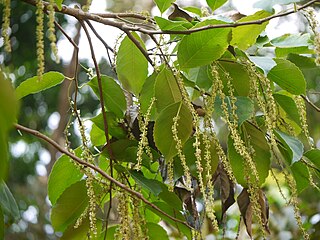
Homalium is a genus of plants in the family Salicaceae.

Tapeinosperma is a genus of plants in the family Primulaceae. It occurs in Australia, New Guinea, Vanuatu, New Caledonia, Fiji. It is morphologically close to Discocalyx.

Styphelia is a genus of shrubs in the family Ericaceae, native from Indo-China through the Pacific to Australia. Most have minute or small leaves with a sharp tip, single, tube-shaped flowers arranged in leaf axils and with the ends of the petals rolled back with hairs in the inside of the tube.

Trochocarpa is a genus of about 16 species of flowering plants in the family Ericaceae native to Australia, New Guinea, Borneo and Malesia. Plants in the genus Trochocarpa are shrubs or small trees, the leaves with more or less parallel veins, flowers in small clusters, each with 5 sepals, petals joined to form a cylindrical or bell-shaped tube, and the fruit a more or less spherical drupe.
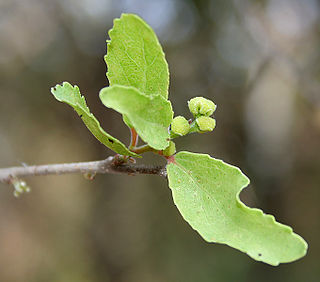
Flacourtia is a genus of flowering plants in the family Salicaceae. It was previously placed in the now defunct family Flacourtiaceae. The generic name honors Étienne de Flacourt (1607–1660), a governor of Madagascar. It contains 23 species of shrubs and small trees that are native to the African and Asian tropics and subtropics. Several species, especially Flacourtia indica, are cultivated as ornamentals and for their fruits. The trunks of small trees are often guarded by branching spines.

Sphyrospermum is a genus of flowering plants belonging to the family Ericaceae.
Themistoclesia is a genus of flowering plants belonging to the family Ericaceae.
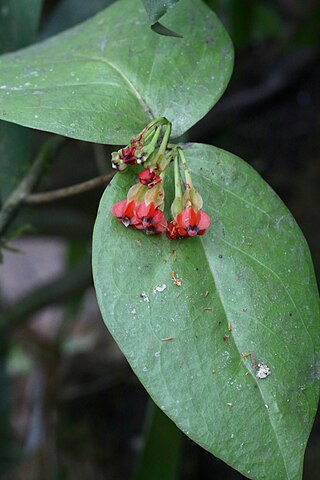
Anthopterus is a genus of flowering plants belonging to the family Ericaceae.
Discocalyx is a genus of flowering plants belonging to the family Primulaceae.
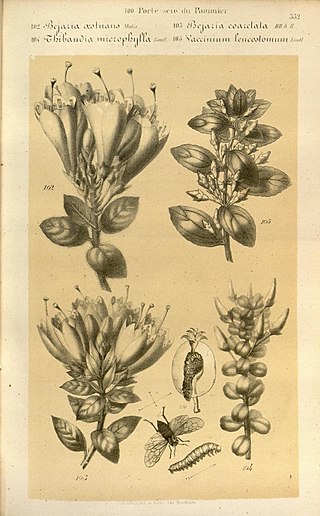
Demosthenesia is a genus of flowering plants belonging to the family Ericaceae.
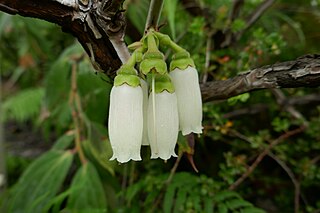
Dimorphanthera is a genus of flowering plants belonging to the family Ericaceae.
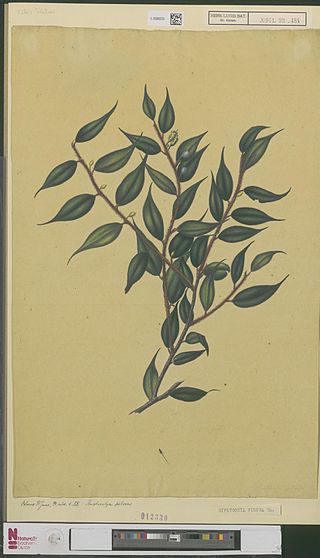
Diplycosia is a genus of flowering plants belonging to the family Ericaceae. Plants of the World Online now treats the genus as a synonym of Gaultheria.
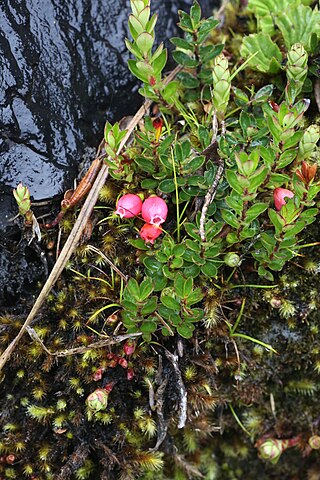
Disterigma is a genus of flowering plants belonging to the family Ericaceae, sometimes referred to as the neotropical blueberries, native to Mexico and Central America as well as Bolivia, Colombia, Ecuador and Perú. These shrubs have adapted to thrive within montane cloud forests and páramos, usually above 2,000 m (6,561') above sea level.
Orthaea is a genus of flowering plants belonging to the family Ericaceae.

Plutarchia is a genus of flowering plants belonging to the family Ericaceae.













